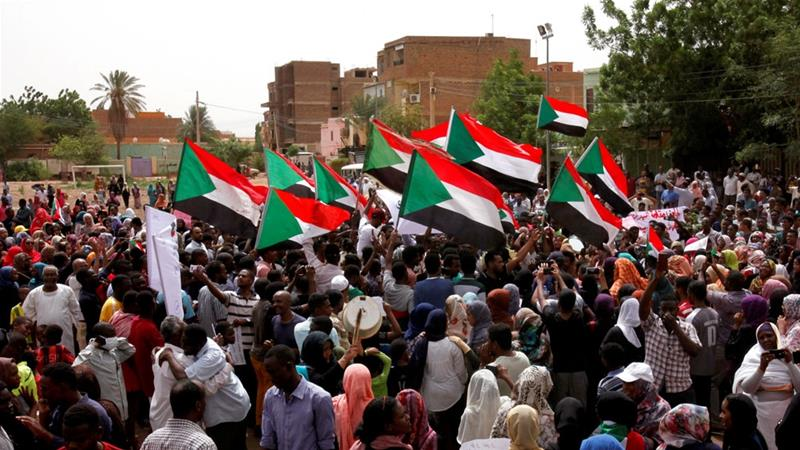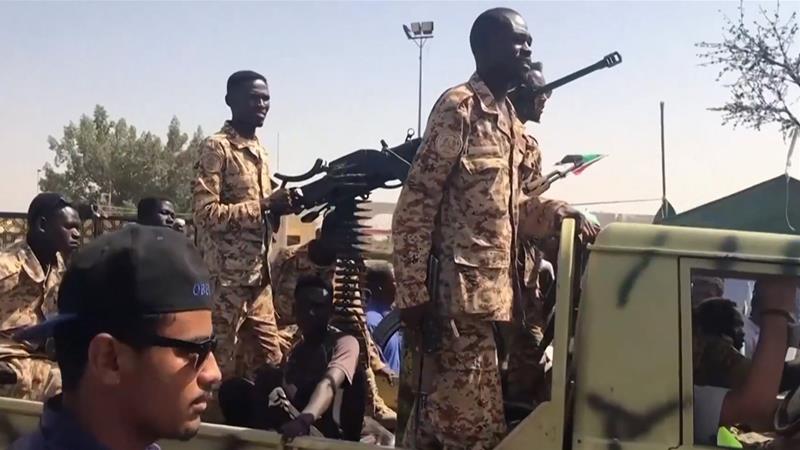Sudan‘s ruling generals and a coalition of protest and opposition groups have reached an agreement to share power during a transition period until elections, in a deal that could break weeks of political deadlock since the overthrowing of autocratic President Omar al-Bashir in April.
Both sides agreed to establish a joint military-civilian sovereign council that will rule the country by rotation “for a period of three years or slightly more”, Mohamed Hassan Lebatt, African Union (AU) mediator, said at a news conference on Friday.
Under the agreement, five seats would go to the military and five to civilians, with an additional seat given to a civilian with military background.
The ruling Transitional Military Council (TMC) and the civilian leaders also agreed to launch a “transparent and independent investigation” into the violence that began on June 3 when scores of pro-democracy demonstrators were killed in a brutal military crackdown on a protest camp in the capital, Khartoum.
Omar al-Degair, a leader of the Forces for Freedom and Change (FFC), an umbrella organisation of opposition groups, said the agreement “opens the way for the formation of the institutions of the transitional authority, and we hope that this is the beginning of a new era”.
TMC deputy head General Mohamed Hamdan Dagalo, who is widely known as Hemeti, welcomed the deal, which, he said, would be inclusive.
“We would like to reassure all political forces, armed movements and all those who participated in the change from young men and women … that this agreement will be comprehensive and will not exclude anyone,” added Dagalo, who also heads the feared paramilitary unit Rapid Support Forces (RSF) accused by the demonstrators of crushing the sit-in outside the military headquarters.
Mass protests
The deal came after two days of talks following the collapse of the previous round of negotiations following the crackdown on the protest camp. Opposition medics say more than 100 people were killed in the dispersal and subsequent violence on June 3. Officials put the death toll at 62.
The TMC and the opposition coalition have been wrangling for weeks over what form Sudan’s transitional government should take after the military deposed al-Bashir on April 11 in the wake of mass protests against his 30-year rule.
Protesters had remained in the streets following al-Bashir’s toppling, fearing the generals intended to cling to power or preserve some form of authoritarian rule.
The AU and neighbouring Ethiopia stepped up mediation efforts to end the crisis and negotiations resumed earlier this week, following massive protests last weekend in which tens of thousands of demonstrators filled the streets of Sudan’s main cities in the biggest show of numbers since the June 3 crackdown.
‘Long process’
Ashraf Mohamed Ali, a protester in Khartoum, called the agreement a “good move for Sudan”.
“It is important to see the implementation of the deal on the ground because the TMC’s actions over the past month proves this council is not serious about giving up power to civilians. And so to have an agreement is in itself a good thing. I am happy but we want to see the deal being implemented.”
Welcoming the two sides’ decision to launch an investigation into the June 3 killings, Ali said “any deal deal that doesn’t include a real investigation isn’t going to be satisfying for the majority of the civilians”.
The protesters were not happy about the possibility of Hemeti “being part of a new government,” Ali said, referring to the RSF’s role in dispersing the Khartoum protest camp.
“But this is the reality. The RSF control everything in Sudan. So if you want to make a deal or if you want to have a civilian government, you need to know how to deal with them, in a way that could serve your agenda.”
Azaz Elshami, a Sudanese-US human rights advocate, dubbed the deal “a PR exercise”, adding that this was going to be “the first step in a very, very long process”.
“It’s very hard for me to trust this power sharing. Hemeti and [TMC head Abdel Fattah] al-Burhan are part of the sovereign council,” said Elshami from Alexandria, Virginia, in the United States.
“Out of the three years, the military will get two years and then the civilian technocrats will have a year later,” she told Al Jazeera.
“This could have been acceptable prior to June 3 violence because at that point of time people had little trust in the military institutions, and Hemeti was seen as an ally.
“What I see from the dynamics of the power, that the FFC has been forced to accept something that is acceptable to other stakeholders,” Elshami told Al Jazeera.
(Source: Al Jazeera)







 WhatsApp us
WhatsApp us 

